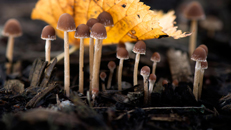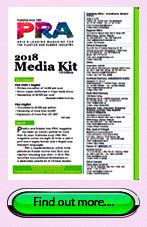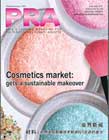PRA Chinese
Rubber Journal Asia Injection Moulding Asia Energy, Oil & Gas Asia
VISIT OUR OTHER SITES:
PRA Chinese
Rubber Journal Asia
Injection Moulding Asia
Energy, Oil & Gas Asia
Plastic-eating fungi could solve piling plastic waste problem

Scientists in the UK say they have discovered a fungus that can break down plastic waste in weeks rather than years and that it could help fight the growing plastic waste problem.
In the first ever report on fungi, by Kew's Royal Botanic Gardens, the fungus known as Aspergillus tubingensis was found on a waste site in Islamabad, Pakistan, by a team of Chinese scientists last year.
The Aspergillus tubingensis was isolated in the soil and broke down chemical bonds of polyurethane (PU) then splitting them using its mycelia, biodegrading it into small pieces. The process took two months, rather than the decades it usually requires for plastic to naturally disintegrate.
The Kew report titled, State of the World's Fungi https://stateoftheworldsfungi.org/2018/reports/SOTWFungi_2018_Full_Report.pdf, says, “fungi could be developed into one of the tools desperately needed to address the growing environmental problem of plastic waste.”
Fungi digests its food by secreting enzymes and absorbing the dissolved organic matter back into cells.
Not only can fungi play in helping clean up the environment, they can also feed on pollutants such as oil spills, toxic chemicals like sarin nerve gas and TNT, and even radioactive waste.
Though the scientists say the research is still in early staged, they hope to see the benefits of fungi for plastic waste in five to ten years.
The report, which involved 100 scientists from across 18 countries, says that 2,189 new species of fungi were described in 2017, while an estimated 2.2 million to 3.8 million species are yet to be described.
Scientists say about 350 species of fungi are eaten as food and the most useful fungi is the ubiquitous mushroom, with a market value for edible mushrooms ballooning to US$42 billion/year. Fungi are used in a number of cheeses, alcohol, bread and UK meat substitute Quorn as well as medicines such as penicillin and statins.
"It has been a real eye-opener drilling into the data on the fungal kingdom," said Kathy Willis, Director of Science at Kew.
She added that their ability to play both Dr. Jekyll and Mr. Hyde roles within their environments is unparalleled.
“For example the fungal kingdom includes yeast, which been used for over 9,000 years to ferment food and drink, but also includes some of the most economically damaging pathogens threatening food security and natural ecosystems," she explained.
(PRA)Subscribe to Get the Latest Updates from PRA Please click here
Copyright (c) 2018 www.plasticsandrubberasia.com. All rights reserved.




























































